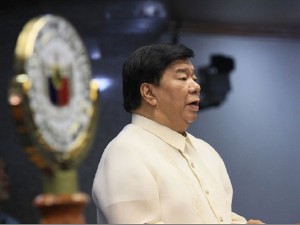MANILA, Philippines — The Philippines didn’t dangle Sabah as a concession to Malaysia for facilitating talks that culminated in a historic peace deal with Moro rebels, Senate President Franklin Drilon said Sunday.
Drilon ruled out any “quid pro quo” in Malaysia’s decision to act as a third party facilitator in the talks between the government and the Moro Islamic Liberation Front, capped by last Thursday’s signing of the deal.
“I’m not aware of any concession. This was done in good faith. Malaysia helped us and we are appreciative of their help. But there was no quid pro quo,’’ he said in a radio interview.
Drilon said that the Philippine government hasn’t given up on its claim to Sabah. “The claim is still there,’’ he said.
The Sabah issue cropped up after the government and MILF negotiators sealed the comprehensive agreement on Bangsamoro in rites witnessed by President Aquino and Malaysian Prime Minister Najib Razak in Malacañang.
The deal seeks to carve out a new, autonomous Bangsamoro with greater political and economic powers than the current Autonomous Region in Muslim Mindanao.
The President last year ordered a “multi-disciplinary’’ study of the country’s claim following the February 2013 incursion into Sabah by the heir of the Sultanate of Sulu and his armed followers to press their claim to the state.
The ensuing standoff with Malaysian forces that mounted air and ground assault left more than 60 people dead and forced thousands of undocumented Filipinos to flee Sabah.
The Philippines made its claim to Sabah in 1962 after the heirs of the Sultan of Sulu and North Borneo gave the government legal authority to negotiate on their behalf.
The Sultanate of Sulu obtained Sabah from the Sultanate of Brunei as a gift for helping put down a rebellion. It leased Sabah to the British North Borneo Co. in 1878, but Sabah became part of Malaysia when it gained independence in 1963.
While Sabah became part of Malaysia in 1963, Kuala Lumpur pays an annual rent to the heirs of the Sultan of Sulu.
Sen. Aquilino Pimentel III agreed that the Sabah issue was separate from the peace talks, and that the signed peace deal would not undermine the Sulu sultanate’s claim to Sabah.
“They’re not connected,’’ he said. “But in terms of goodwill, Malaysia scored big in goodwill because they helped a lot in the comprehensive agreement on Bangsamoro. Our esteem for Malaysia went up by several notches.’’
The country’s claim to Sabah is “separate matter’’ altogether that could only be resolved by an international body, according to Pimentel.
“Between friends, an issue could be resolved before an international court. That’s being done in Europe,’’ he said. He said he wasn’t aware that Sabah was being given up, or that the other party was asking for it.
“We should not worry about Sabah because there’s the Sultanate of Sulu, a certain sector of the Philippines that is interested in the issue, and isn’t letting go of it,’’ he said.
Drilon reiterated that the Senate expected the Transition Commission to submit a draft Bangsamoro basic law (BBL) that complies with the Constitution. He said they would strive to pass it by year-end in time for its ratification by the following year, and expressed the hope that his colleagues would “give peace a chance.’’
The draft BBL would be referred to the committee on local government for hearings, Drilon said. Pimentel said it would be logical to hold some of the hearings in the areas to be covered by the new political entity.
Drilon, however, conceded that the more difficult work lay in bridging the apparent “mistrust’’ between Christians and Muslims on the ground.
“During the signing, I had a chance to talk to Cardinal [Orlando] Quevedo. He said this won’t be easy because there’s still mistrust on both sides – not only in government, but between Christians and Muslims in parts of Mindanao,’’ he said.
“A lot of convincing must be done… there must be trust. That’s why confidence building is critical in our implementation of this agreement,’’ he added.
RELATED STORIES
Abuse of Filipino ‘illegals’ in Sabah probed
